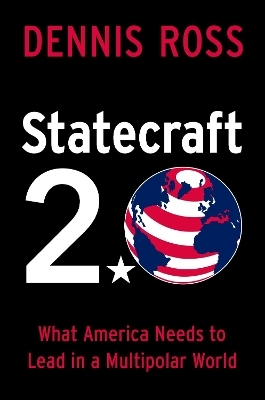
Statecraft 2.0
Oxford University Press Inc (Verlag)
978-0-19-769892-1 (ISBN)
- Noch nicht erschienen (ca. April 2025)
- Versandkostenfrei innerhalb Deutschlands
- Auch auf Rechnung
- Verfügbarkeit in der Filiale vor Ort prüfen
- Artikel merken
The United States may still be the world's strongest country, but it now faces real challenges at both a global and regional level. The unipolar world which was dominated by America after the Cold War is gone. Unlike the Soviet Union, China is both a military and economic competitor and it is actively challenging the norms and institutions that the US used to shape an international order during and after the Cold War. Directly and indirectly, it has partners trying to undo the American-dominated order, with Russia seeking to extinguish Ukraine, and Iran trying to undermine American presence, influence, and any set of rules for the Middle East that it does not dominate.
The failures of American policy in Afghanistan and Iraq have weakened the domestic consensus for a US leadership role internationally. Traditions in US foreign policy, especially the American sense of exceptionalism, have at different points justified both withdrawal and international activism. Iraq and Afghanistan fed the instinct to withdraw and to end the "forever wars." But the folly of these US interventions did not necessarily mean that all use of force to back diplomacy or specific political ends was wrong; rather it meant in these cases, the Bush Administration failed in the most basic task of good statecraft: namely, marrying objectives and means. Nothing more clearly defines effective statecraft than identifying well-considered goals and then knowing how to use all the tools of statecraft--diplomatic, economic, military, intelligence, information, cyber, scientific, education--to achieve them. But all too often American presidents have adopted goals that were poorly defined and not thought through.
In Statecraft 2.0, a significant update of the first edition, Dennis Ross explains why failing to marry objectives and means has happened so often in American foreign policy. He uses historical examples to illustrate the factors that account for this, including political pressures, weak understanding of the countries where the US has intervened, changing objectives before achieving those that have been established, relying too much on ourselves and too little on allies and partners. To be fair, there have not only been failures, there have been successes as well. Ross uses case studies to look more closely at the circumstances in which Administrations have succeeded and failed in marrying objectives and means. He distills the lessons from good cases of statecraft--German unification in NATO, the first Gulf War, the surge in Iraq 2007-8--and bad cases of statecraft--going to war in Iraq 2003, and the Obama policy toward Syria. Based on those lessons, he develops a framework for applying today a statecraft approach to our policy toward China, Iran, and the Israeli-Palestinian conflict. The book concludes with how a smart statecraft approach would shape policy toward the new national security challenges of climate, pandemics, and cyber.
Dennis Ross served in senior national security positions as a political appointee for Ronald Reagan, George H.W. Bush, Bill Clinton, and Barack Obama. He played a prominent role in shaping American policy toward the former Soviet Union, working out German unification in NATO, developing the Gulf War coalition, putting together the Madrid Peace Conference, negotiating between Arabs and Israelis as the chief American envoy, and later helping to formulate American approaches toward Iran. After his formal governmental stints, he has been an active participant in track two diplomatic efforts and discussions. He is a frequent commentator in the media on the Middle East and other international hotspots. Ross is presently the Davidson Distinguished Fellow at the Washington Institute for Near East Policy and a Distinguished Professor in the Practice of Diplomacy at Georgetown University.
| Erscheint lt. Verlag | 19.4.2025 |
|---|---|
| Reihe/Serie | Bridging the Gap |
| Verlagsort | New York |
| Sprache | englisch |
| Maße | 156 x 235 mm |
| Themenwelt | Sozialwissenschaften ► Politik / Verwaltung ► Europäische / Internationale Politik |
| ISBN-10 | 0-19-769892-1 / 0197698921 |
| ISBN-13 | 978-0-19-769892-1 / 9780197698921 |
| Zustand | Neuware |
| Haben Sie eine Frage zum Produkt? |
aus dem Bereich


